Related Research Articles
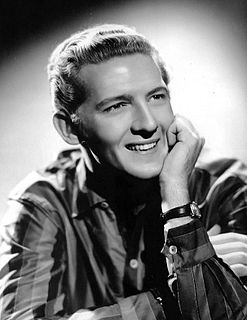
Jerry Lee Lewis is an American singer and pianist, often known by his nickname, The Killer. He has been described as "rock & roll's first great wild man and one of the most influential pianists of the twentieth century."

"You'll Never Walk Alone" is a show tune from the 1945 Rodgers and Hammerstein musical Carousel. In the second act of the musical, Nettie Fowler, the cousin of the protagonist Julie Jordan, sings "You'll Never Walk Alone" to comfort and encourage Julie when her husband, Billy Bigelow, the male lead, falls on his knife and dies after a failed robbery attempt. It is reprised in the final scene to encourage a graduation class of which Louise is a member. The now invisible Billy, who has been granted the chance to return to Earth for one day in order to redeem himself, watches the ceremony and is able to silently motivate the unhappy Louise to join in the song.

"Me and Bobby McGee" is a song written by American singer-songwriter Kris Kristofferson and originally performed by Roger Miller. Fred Foster shares the writing credit, as Kristofferson intended. A posthumously released version by Janis Joplin topped the U.S. singles chart in 1971, making the song the second posthumously released No. 1 single in U.S. chart history after "(Sittin' On) The Dock of the Bay" by Otis Redding. Jerry Lee Lewis also released a version reaching number 1 on the country charts in 1971. Billboard ranked Joplin's version as the No. 11 song for 1971.
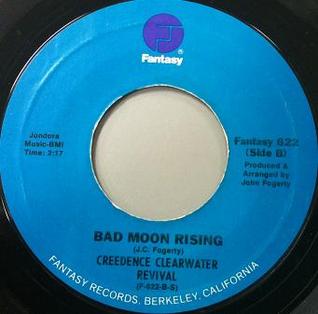
"Bad Moon Rising" is a song written by John Fogerty and performed by Creedence Clearwater Revival. It was the lead single from their album Green River and was released in April 1969, four months before the album. The song peaked at No. 2 on the Hot 100 on 28 June 1969 and reached No. 1 on the UK Singles Chart for three weeks in September 1969. It was CCR's second gold single.
"Don't Let the Stars Get in Your Eyes" is a country song about a man away from home who's worried that his paramour may unwittingly stray from their relationship. The song was recorded in many different styles by many artists. It was written by Winston L. Moore and was published in 1952.
"Green, Green Grass of Home", written by Claude "Curly" Putman Jr. and first recorded by singer Johnny Darrell in 1965, is a country song made popular by Porter Wagoner the same year, when it reached No. 4 on the country chart. It was also recorded by Bobby Bare and by Jerry Lee Lewis, who included it in his album Country Songs for City Folks. Tom Jones learned the song from Lewis' version, and in 1966, he had a worldwide No. 1 hit with it.
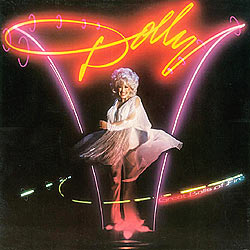
Great Balls of Fire is the twenty-first solo studio album by American singer-songwriter Dolly Parton. It was released on May 28, 1979, by RCA Victor. The album was produced by Dean Parks and Gregg Perry with Parton and Charles Koppelman serving as executive producers. The album peaked at number four on the Billboard Top Country Albums chart and number 40 on the Billboard 200. Two of the album's four singles charted in the top ten of the Billboard Hot Country Songs chart. "You're the Only One" topped the chart, while"Sweet Summer Lovin'" peaked at number seven. The album has been certified Gold in the United States.

"Walk Right In" is a country blues song written by musician Gus Cannon and originally recorded by Cannon's Jug Stompers in 1929. Victor Records released on a 78 rpm record and in 1959, it was included on the influential compilation album The Country Blues. A revised version of the song by the Rooftop Singers, with the writing credits allocated to group members Erik Darling and Bill Svanoe, became an international hit in 1963.
"From a Jack to a King" is a country music song. Originally a crossover hit for artist Ned Miller, who also wrote "Dark Moon", "A Falling Star", and many other country songs. It has been covered extensively by country music artists.

This is a detailed discography for American rock and roll, country, and gospel singer-songwriter Jerry Lee Lewis. One of the pioneers of rockabilly, Lewis has recorded over 40 albums in a career spanning seven decades. Lewis is a versatile artist, and has recorded songs in multiple genres. Lewis, in 1986, was one of the first inductees into the Rock and Roll Hall of Fame, and, as of 2020, is the last surviving rock and roll pioneer of Sun Records Some of his best known songs are "Great Balls of Fire", "Whole Lotta Shakin' Goin' On", and "High School Confidential". His album, Live at the Star Club, Hamburg, is widely considered one of the greatest live concert albums ever. In his lengthy career in music, Lewis has had 30 songs reach the top ten on the "Billboard Country-and-Western" chart. Lewis is regarded as one of the greatest and most influential pianists of the rock and roll era, and was ranked number 24 on Rolling Stone magazine's list of the "100 Greatest Artists of All Time".

"Walk a Mile in My Shoes" is a song written by Joe South, who had a hit with it in 1970. South was also producer and arranger of the track, and of its B-side, "Shelter". The single was credited to "Joe South and the Believers"; the Believers included his brother Tommy South and his sister-in-law Barbara South.

"Can't You See" is a song written by Toy Caldwell of The Marshall Tucker Band. The song was originally recorded by the band on their 1973 debut album, The Marshall Tucker Band, and released as the album's first single. It was re-released in 1977 and peaked at number 75 on the Billboard Hot 100. Cover versions of "Can't You See" have charted for Waylon Jennings and the Zac Brown Band with Kid Rock (2010).
"Reconsider Me" is a country/soul ballad written by Margaret Lewis and Mira Smith. Johnny Adams's 1969 version was his biggest hit, peaking at number eight on the American R&B charts and number 28 on the pop charts. In the same year, Ray Pillow's country version hit number 38 on the country charts.
"She Even Woke Me Up to Say Goodbye" is a song written by Doug Gilmore and Mickey Newbury, and recorded by American country music artist Jerry Lee Lewis. Released in September 1969, it was the first single from his album She Even Woke Me Up to Say Goodbye. The song peaked at number 2 on the Billboard Hot Country Singles chart. It also reached number 1 on the RPM Country Tracks chart in Canada.
"Invitation to Your Party" is a single by American country music artist Jerry Lee Lewis. Released in July 1969, it was the first single from his album The Golden Cream of the Country. The song peaked at number 6 on the Billboard Hot Country Singles chart. It also reached number 1 on the RPM Country Tracks chart in Canada.
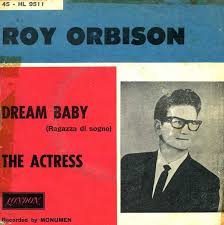
"Dream Baby " is a song written by Cindy Walker which was first recorded and released by Roy Orbison originally as a non-album single in 1962. It was a big international hit for Orbison, where it reached number 2 in both the Australian and the U.K. singles charts and number 4 in the U.S. Billboard. It was also a top ten hit in Canada and Norway. Five months later, "Dream Baby" was included on Orbison's Greatest Hits compilation LP.
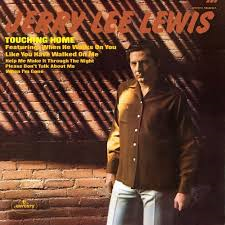
Touching Home is an album by Jerry Lee Lewis that was released on Mercury Records in 1971.
"Once More with Feeling" is a song written by Kris Kristofferson and Shel Silverstein and originally recorded by Jerry Lee Lewis in 1969 for Smash Records. The song was part of Lewis's studio album She Even Woke Me Up to Say Goodbye and was also released as a single, reaching number 1 on the Cash Box Country Singles chart and number 2 on the Billboard country chart.
"Always Remember" is a song written by Jerry Bradley and Patsy Lawley. It was first recorded by American country singer-songwriter Bill Anderson. It was released as a single in 1971 via Decca Records and became a major hit the same year.
References
- ↑ "Jerry Lee Lewis singles". Allmusic . Retrieved 24 March 2011.
- ↑ "RPM Country Singles for September 25, 1971". RPM . Retrieved 24 March 2011.
| | This 1970s country song–related article is a stub. You can help Wikipedia by expanding it. |